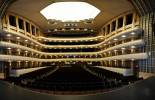Joshua Bell conducting orchestra from violin chair
Joshua Bell has already played The Smith Center for the Performing Arts - as a guest performer at last month's opening-night gala.
This weekend, however, he's bringing some friends: the London-based chamber orchestra Academy of St. Martin in the Fields.
Bell, who's been the ensemble's music director since September, leads the orchestra in an all-Beethoven program Saturday night in Reynolds Hall. But not from a podium.
That's because Bell happens to be a virtuoso violinist - and Beethoven's Violin Concerto in D major happens to be on the program. (It's the second time in two weeks Las Vegas audiences will hear Beethoven's one-and-only violin concerto; Nikolaj Znaider played it with the Cleveland Orchestra last Saturday.)
So Bell will be "leading them from the violin chair," he explains during a telephone interview. "In a way, you're getting rid of the middle man, so to speak."
Indeed, "not having a conductor eliminates some of the problems I've had with conductors," he admits. "It's more organic."
Rounding out Saturday's all-Beethoven program: the Coriolan Overture and Symphony No. 4 in B flat.
"It's not easy" to "play and cue and inspire every musician onstage," Bell acknowledges. But at least he can count on his rapport with his fellow musicians.
After all, he's been playing with the Academy of St. Martin in the Fields since he made his first recording with them at the ripe old age of 18. (He's now 44.)
"We just hit it off," he says of the ensemble, whose members he describes as "some of the best musicians around. There was just a chemistry I felt really worked."
They must have felt it too, which explains why "they asked me to be their music director," he points out.
As a soloist, Bell's tours usually find him playing his concerto, then "eating my dinner" by the time intermission ends.
As conductor and soloist, however, he's onstage for the entire concert - and doing "a lot more work, but it's incredibly gratifying," he says.
For one thing, "you have to be very aware of everything going on," although "that's really something every soloist should do anyway," in Bell's view.
Conducting has "forced me to get inside the orchestra and really get inside of the score," he explains. "I feel I play my own part better."
The shift also means he's "able to explore the symphonic repertoire" of such composers as Beethoven and Mozart.
"These are works I've known my whole life as an appreciator - and now I get to put my stamp on them," Bell says.
Listeners around the world will be able to hear the result; at the conclusion of their current 15-city U.S. tour, Bell and the Academy of St. Martin in the Fields will record Beethoven's Fourth and Seventh symphonies.
"It's a little bit daunting," Bell admits of the recording date, "because those (works) have been done by every great conductor in the history of music."
But it's also more than a little bit exciting - which, for Bell, remains his primary goal.
It also helps explain a career that encompasses everything from bluegrass to the Beatles. (His recording "Joshua Bell at Home With Friends," for example, includes a collaboration with Stratosphere headliner Frankie Moreno on "Eleanor Rigby.")
"I don't want to be pigeonholed into one thing," Bell insists, noting European attitudes of " 'You're an American, so you play Samuel Barber,' " referring to the American composer of such renowned works as "Adagio for Strings," familiar to anyone who's seen (and heard) the Oscar-winning "Platoon."
Because "I don't want to be known as they guy who plays American music," Bell says, "I try to keep people guessing." But ultimately, "I just play the music that I like."
Last month, Bell brought his 299-year-old Stradivarius to The Smith Center for the opening gala at Reynolds Hall. But because the show (which also featured, among others, Willie Nelson, Merle Haggard and Carole King) was recorded for a future PBS telecast, Bell's performance was amplified electronically.
"I can't wait to go back and see what it feels like" with Reynolds Hall's unamplified acoustics, he says. "I was impressed with the hall."
As for The Smith Center's stated acoustical goal of "Carnegie Hall or better," Bell says, "that's aiming high. I hope they did it."
He and his colleagues from the Academy of St. Martin in the Fields will find out soon enough.
"It's certainly a world-class space," Bell comments, and the fact that Las Vegas has it "will change the perception of Las Vegas in a very exciting way," he predicts, making Glitter City "a regular stopping place for major orchestras and concert events."
Including, of course, Saturday's concert by the Academy of St. Martin in the Fields and its violin-playing conductor.
Contact reporter Carol Cling at ccling@reviewjournal.com or 702-383-0272.
Preview
Academy of St. Martin in the Fields with Joshua Bell
7:30 p.m. Saturday
Reynolds Hall, The Smith Center for the Performing Arts, 361 Symphony Park Ave.
$42-$141 (749-2000)




























